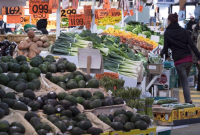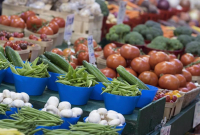Support strong Canadian climate journalism for 2025
On a visit to an agricultural fair in a battleground riding east of Montreal Tuesday, Conservative leader Andrew Scheer defended his promise to review the Canada Food Guide in order to make the document reflect research put forward by the country's food industry.
Scheer drew the Liberals' ire last week after he told dairy farmers in Saskatoon the guide is flawed. Health Canada's new guide did away with traditional food groups and portion sizes and focused instead on broader guidelines, including eating more plant-based protein and drinking more water.
The Liberals say the document has received an overwhelmingly positive response, including from nutrition experts. They allege Scheer is bowing to special interests and declaring war on Health Canada's research.
"Their reaction is exaggerated and merits an Oscar for acting," Scheer said in St-Hyacinthe, Que., about 60 kilometres east of Montreal.
"There are (industry) sectors saying their information was not included," he added. "There have been dietitians and nutritionists that highlighted weaknesses in the guide, such as a lack of emphasis on iron and calcium."
While Scheer rejected Liberal accusations he was pandering to the agricultural industry, he and the province's dairy farmers have a history together.
Scheer's former rival for the leadership of the party, Maxime Bernier, accuses him of colluding with the province's farmers in the last months of the 2017 race. Bernier says roughly 10,000 Quebecers joined the Tories during that period but didn't renew their membership the next year.
Bernier, who advocates abolishing the federal supply management system that protects the poultry, dairy and egg industry from foreign competition, says farmers bought memberships in order to ensure he lost to Scheer, who advocated keeping supply management. Scheer ended up narrowly beating Bernier.
Marcel Riendeau, 71, was one of those farmers who voted for Scheer in the Tory leadership race. But he kept his party membership.
"I'm voting for Scheer (in the election)," the farmer from St-Hyacinthe said Tuesday. "I've stopped voting Liberal." Riendeau said he doesn't think Trudeau can defend Canada's interests on the world stage. "Trudeau walks around saying he'll stand up, but he doesn't. He sits down," he said.
"Look at what Trump did to him at the last G-7 meeting," Riendeau said, referring to the U.S. president calling Trudeau weak and dishonest following last summer's conference in Quebec.
Scheer will need more people like Riendeau on his side if he hopes to take the riding of Saint-Hyacinthe-Bagot. The agricultural region is currently represented by the NDP's Brigitte Sansoucy, and the Tories finished fourth in 2015.
This year the Conservative candidate is former television boxing analyst Bernard Barre.
Lise Boulay, 56, said though she voted Liberal in 2015, she is open to considering other parties — but not the Conservatives.
"I don't think so," Boulay said about the Tories as she watched Scheer walk through the agricultural fair. "They don't share my convictions, my values. He is just too conservative."





Comments
"Exaggerating" is Scheer-speak for "lying" but his claims are empty posturing. No one in Canada takes the guide as a bible, People go on eating as their culinary heritage suggests, or they slip into the laziness of fast, processed, under nourishing, over salted. over sugered, generally nutritionally useless food.
What Scheer may have failed to consider is that raising a controversy over the guide may actually get people to pay attention to it! On top of which his overt support for the meat and dairy sectors makes it plain to Canadians that politicians readily pander to "special interests".
Both meat & dairy are panicking over the trend away from animal based products. We can hope that the "factory" animal products agri-business just might take note and improve their animal "husbandry" as human revulsion over factory farms and abattoires is one of the major drivers of of this trend.
There is also the question of what the guide does not provide. it makes no mention of remedies for "food deserts", for "misleading" inadequate labelling, it doesn't even allude fleetingly to the inadequacies of the Canada food protection act or its monitoring agency. It fails to account for the growing number of Canadians who have to adopt special diets because of systemic chronic disease, or the onset of food sensitivities/allergies. When one is barred from gluten or lactose, or can't digest the FODMAPS, or has to give up salt and/or potassium, etc., creating a healthy, balanced diet becomes a full time occupation, with hours spent in grocery aisles, squinting at the minuscule fine print listing ingredients. Specialized food manufacturers and processors prey on dietary sufferers by charging extortionate prices for their products and supplies in stores are inconsistent or non-existent.
Nutritionists are apt to scoff at people with "sensitivities" and act as though all produce is equally nutritious despite scientific studies showing that most non-organic, factory farmed food raised on overfertilized, exhausted soils devoid of the natural complement of minerals, & biological life forms is markedly less supplied with the vitamins and minerals traditionally associated with those foods.
Big Ag, calls those of us who mention these facts and link them to obesity, and other ills, CRANKS, and too many of the professional nutritionists fail to examine them - because too many of them work for the industries. Big Ag has drastically reduced the bio-diversity of the products that go into our processed foods, and even when one patronizes farmers markets, too often the produce available features exactly they same breeds of vegetables & fruits selected for qualities like "shipping stability", predictable maturity/harvesting time, to the detriment of taste and nutritional value.
Canada's food guide is a flawed, faulty, and inadequate short cut response to the serious business of feeding and sustaining healthy Canadians and a healthy food system.